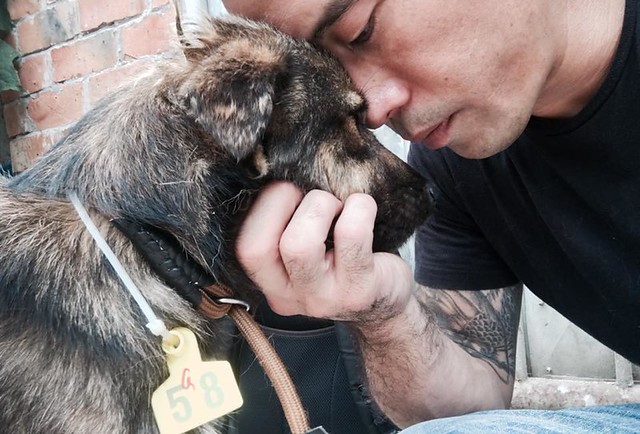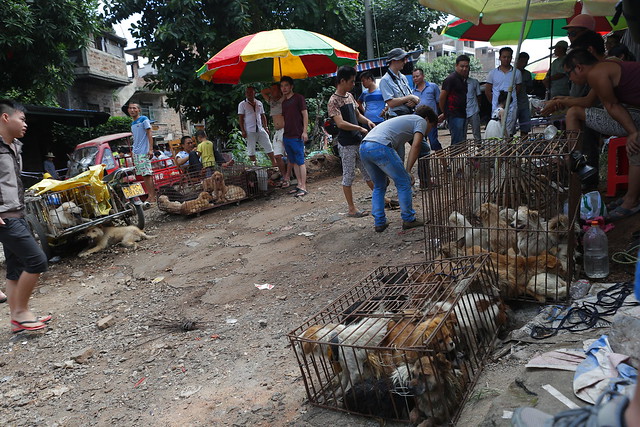When a family in Korea discovered their beloved dog, Cheom Hwa, had been stolen, they were inconsolable. The German Shepherd had been with them since she was a puppy. “She is like my family,” the daughter says to Marc Ching, founder of Animal Hope and Wellness Foundation. “I am the only child so she was like my sister.”
It’s a nightmare no dog owner wants to have to go through. In Korea, where Cheom Hwa’s family lives, millions of dogs are stolen every year for their meat, and many are suspected to be stolen pets.
 Photo courtesy of Animal Hope and Wellness FoundationChing is aware that there are many who disagree with what he’s doing, but he believes his foundation can make a difference in the lives of thousands of dogs.
Photo courtesy of Animal Hope and Wellness FoundationChing is aware that there are many who disagree with what he’s doing, but he believes his foundation can make a difference in the lives of thousands of dogs.
“The dog meat trade is big business,” Ching tells Earth Island Journal. “China exports meat to Korea. Cambodia exports to Vietnam.”
Ching, an American animal nutritionist who runs an organic pet food company in California, first heard about the Yulin dog meat festival that’s held every year in southern China only two years ago. The stories sounded so horrific that he had a hard time believing they were true. When he flew to China to see for himself what was going on, the atrocities turned out to be even worse. “What they’re doing is beyond inhumane,” Ching says. “It’s pure evil. They’ll boil dogs alive, hang and skin them alive.”
Today, Ching is most known for going undercover into slaughterhouses. By posing as a meat buyer, Ching often manages to get access to the kill floor where cages of whimpering animals are stacked on top of one another. The owner, hoping to make a sale, proudly talks up the facility, explaining their slaughtering process and how many dogs they go through on any given day. All the while, an iPhone in Ching’s pocket remains on video mode, surreptitiously recording everything.
If he’s caught, best-case scenario: He loses his phone. A previous trip to Vietnam ended with him beaten and nearly killed.
For Ching, the risk is worth it, even if too many of the dogs end up dying on the way to the veterinary hospital. Most are already close to death by the time he gets to them. In an interview with LA Weekly, he talks about coming across a dog with all four of her legs cut off. She died in his arms.
“You will never see, in my opinion, anything more brutal than the dog meat trade,” Ching says.
In the years since his first trip to China, he’s witnessed more than his share of unimaginable cruelty. The horror doesn’t deter him; it’s more like gasoline poured onto a smoldering flame urging him to save as many as he can. But while many activists are fueled into action by anger, Ching fervently believes that compassion is the key to lasting change.
“Even the people killing animals who, to me, aren’t good people,” Ching says, “I still try to be compassionate toward them. I think compassion wins in most cases and that’s what we do out in these countries. It’s all about compassion.”
Ching’s philosophy is evident with every trip back to Asia. He often works with locals, building his trip around the information they tell him. Before he steps onto a plane, he already knows who to talk to and where to go. For instance, in early 2017, locals in Korea helped to arrange a meeting with the owner of a slaughterhouse. This isn’t an undercover mission. The man knows that Ching wants to shut down his business.
With the help of a local translator, Ching makes his appeal. “There’s a push against what you’re doing,” he tells him. “Whether it happens today, next year, or five years, you’ll be out of business soon. I’d like to work with you to stop what you’re doing and give you a chance at a decent living that doesn’t involve harming animals.”
The conversation is one Ching has had before with other slaughterhouse owners. His foundation’s economic development program is an attempt to build a viable model to affect far-reaching change. With enough successful cases, he hopes the Chinese government will someday take it over.
When asked about the people who slaughter dogs for a living, Ching recalls a man in Cambodia running a smaller operation that slaughters 50 to 100 dogs a day. “This guy sold his two daughters into prostitution. One of his daughters was four years old. I think he’s a terrible guy but he told me he didn’t choose to do this. He had to feed his family somehow and he became a dog slaughterer.”
It isn’t easy for Ching to sit across men who commit such horrific acts. Those who get into the business for money tend to be receptive, but there are always exceptions.
“In a slaughterhouse in Indonesia,” Ching says, “they hang dogs off these hooks and torture them. This guy is very popular for what he does because people come there believing the meat has healing powers. He’ll say, ‘I help people live better. I cure diseases like cancer.’ This guy will never close because he really believes in what he’s doing.”
 Photo courtesy of Animals AsiaA dog meat market in Yulin, China. Several China-based animal welfare groups have asking international animal rights activists to stop buying dogs bound for the meat market saying that purchasing dogs only encourages the black market dog meat trade.
Photo courtesy of Animals AsiaA dog meat market in Yulin, China. Several China-based animal welfare groups have asking international animal rights activists to stop buying dogs bound for the meat market saying that purchasing dogs only encourages the black market dog meat trade.
Ching knows there are many who disagree with what he’s doing. “A lot of people don’t realize that we are a highly attacked foundation,” Ching says. “The associations that run the meat out there for dogs, they slander us constantly. A lot of things that you’ll see in China are paid for by dog slaughterers to discredit us, which makes sense because we’re trying to take away their livelihood.”
While he has received much praise and support for his work to save the dogs, his actions have also been criticized by animal welfare groups in China.
“The only way the dog meat trade in China (Asia) is going to end is from the inside, not by foreigners marching in waving money and huge egos,” says Sally Anderson, the founder of Hong Kong Dog Rescue, a Hong Kong based organization that has worked to save unwanted dogs since 2003.
Lee-Anne Armstrong, director of Second Chance Animal Aid, has previously expressed “deep reservations” about well-intentioned international activists like Ching who pay huge sums of money to rescue dogs bound for the Yulin festival. Her organization is based in Shanghai and has been rescuing animals since 2005. In an article published in Forbes, she says, “The dogs who are not sick on these rescue missions fall ill due to the overcrowded, ill-equipped makeshift shelters run by local activists who will always take in animals regardless of their ability to adequately care for them.”
Armstrong’s group was among several China-based animal welfare groups that wrote a joint letter asking activists to stop buying dogs bound for the meat market. “By buying dogs in Yulin you objectively become part of the black market dog meat trade,” the letter said.
Criticism of Ching’s work escalated last year after he, along with a team of volunteers and a local Buddhist group, rescued about 1,000 dogs meant for the Yulin festival by paying dog-meat traders for their animals and getting them to halt operations during the festival. Months after the June operation, reports began emerging about how at least two-thirds of the dogs had since died due to lack of adequate care and local shelters for the animals.
Despite the opposition and the criticism, Ching believes his foundation can make a difference. He’s seen and learned a lot since his first trip to Yulin two years ago. As a result, his focus has since expanded to find ways to involve the local government. “I’m not perfect. I’m not this great person people think I am. I’m just a normal guy trying to do something and I have a lot to learn,” he told South China Morning Post in January.
That same month, he met with Yulin’s Chief of Police and a government official in charge of political affairs. The discussion centered around the dog meat festival and how best they can work together. Ching says he doesn’t intend to purchase any dogs from Yulin this year. Instead, he is excited about a new initiative he’s set into motion in China. His foundation is in the process of microchipping 100,000 to 150,000 dogs in cities where the dog meat trade is particularly active.
“In China, there is a law that says that microchipped pet dogs are private property,” Ching says. “When someone steals a car, there are punishments in place for personal property theft and that’s the angle we’re taking to make dog meat trade illegal in certain provinces. We’re hoping in time we have enough data, enough stolen dogs, to push our point: ‘Hey, we’ve already rescued a thousand slaughterhouse dogs that have been stolen. Please make a ban because these dogs are stolen property.’”
This includes dogs like Cheom Hwa, the German Shepherd that had been stolen from her family in Korea.
After brokering a deal with the slaughterhouse owner in Korea earlier in 2017 Ching showed up at the building with other activists to shut it down. It’s backbreaking, heartrending work to sort through all the animals. Suddenly, one of the activists shouted with excitement, a microchip scanner in hand, standing next to a female German Shepherd cowering in a cage nearby.
The owner of the now-defunct slaughterhouse says he got her from a farm where she was being used as a breeding dog. No one knows if he’s telling the truth, but it doesn’t matter now. When Ching called Cheom Hwa’s family with the news, they burst into tears.
Before the reunion, the family worried their dog wouldn’t be the same, that she wouldn’t recognize them after being gone for so long. Their fears evaporated as soon as they saw Cheom Hwa barreling toward them and into their arms.
“Through all the death we have seen,” Ching wrote on Facebook about the miracle. “Through all the blood and the suffering. It is these moments that help me to believe that what I am doing is right. That in the end, the scars I push inside, that it will be worth it.”
We don’t have a paywall because, as a nonprofit publication, our mission is to inform, educate and inspire action to protect our living world. Which is why we rely on readers like you for support. If you believe in the work we do, please consider making a tax-deductible year-end donation to our Green Journalism Fund.
Donate